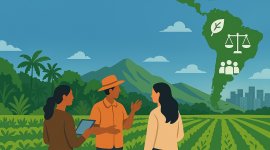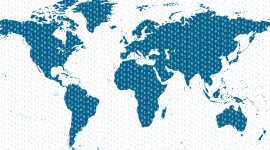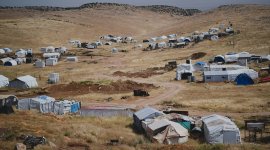Rural Development Academy 2021

Online
Rural Development Academy 2021
Human-centred recovery from the COVID-19 pandemic through decent work in Africa
12–23 Abril 2021
Key features
LEARN DIFFERENTLY
Innovative training methodologies and integrated use of digital learning technology
THREE PHASES
Learning starts with introductory self-learning modules, continues through high-quality, engaging “real time” plenary and elective sessions, and ends with an individual assignment
CERTIFICATE OF ACHIEVEMENT
Successful candidates will obtain an ITCILO Certificate of Participation, or a Certificate of Achievement
HIGH-LEVEL RESOURCES
Learn from ITCILO trainers and ILO and global specialists on issues related to rural development and employment
Apresentação do curso
Decent and sustainable work in the rural economy is essential to achieve the 2030 Sustainable Development Agenda and its overarching objective of leaving no one behind. Rural areas provide livelihoods and employment for millions of women and men in Africa, in agriculture as well as in rural non-farm activities. Work in rural areas, however, is often characterized by decent work deficits, including governance gaps, informality, underdeveloped production systems and limited access to services, infrastructure and social protection. Some of these deficits have further been exacerbated by the unprecedented COVID-19 pandemic. The 2021 edition of the Rural Development Academy will focus on the African region, and will be held virtually using the online learning methods on both self-learning as well as more interactive and participatory methods. This allows for a more in-depth and focussed approach to the topics, as well as wider participation of constituents and stakeholders from the region, as well as those interested in promoting decent work in the rural economy in the African region.
Perfil dos participantes
ILO's tripartite constituents, policy makers involved in rural development, practitioners from development partner agencies and international organizations, social innovators and entrepreneurs, and members from academia and civil society organizations. While the regional focus of the Academy is on Africa, participants from all over the world are welcome to join the event.
What will I be able to do?
This edition of the Rural Academy provides an opportunity for the participants to learn and share on a range of innovative approaches, tools and methods for promoting decent work in human-centred recovery to the COVID-19 crisis in the rural economy of the African region.
Participants to this Academy will
- Acquire knowledge, including tools and practical methods to promoting decent work in the rural economy in the changing world of work, adaptable to their own national and local contexts;
- Share knowledge while learning from a community of practitioners with common interests in rural development; and
- Gain a deeper understanding of the roles of policy makers, including workers’ and employers’ organizations, required for the promotion of integrated and inclusive rural development and building back better in the African region.
What topics does this course cover?
The Academy covers wide variety of issues related to human-centred recovery in the rural economy in the African region for building back better.
The ILO has put forward an approach to build a brighter and more resilient future in the rural economy across Africa through three steps: Stepping up (improving and intensifying agricultural production and related employment), Stepping out (diversify employment opportunities away from agriculture) and Stepping ahead (investments and infrastructure for better decent work outcomes). This approach will provide the framework for the learning paths in the Rural Academy.
The role of sectoral policies for increased productivity and productive transformation and a human centred recovery will be a major focus of the academy, and the impact of and responses to the COVID-19 pandemic will be a cross-cutting theme across the sessions. The agenda and the contents of the sessions have been developed in close collaboration with the ILO offices in Africa to ensure the inclusion of the topics and issues that are among the most relevant ones for the region.
The full agenda will be made closer to the event.
Online self-learning
In the first week of the Academy, the participants will follow the self-learning online training course developed for the Academy, which introduces the concept of decent work in the rural economy; look at the policies for decent work in the rural economy; and a just transition towards environmental sustainability in the rural economy. Approaches and strategies to respond to the impacts of COVID-19 are crosscutting throughout the online modules.
Plenaries
The plenary sessions are offered on most mornings, and include topics such as formalization of the informal economy, occupational safety and health, social dialogue, fundamental principles and rights at work, gender equality and women’s empowerment, public investments, and skills and technologies.
Elective courses
The participants will choose one additional elective course in both weeks. These electives will provide a more focused and in-depth understanding on specific topics. They consist of a total of 4,5 hours of online learning with experts from ILO and other organizations.
How?
The course consists of a number of online modules offered through the ITCILO e-Campus online platform to be completed during the two weeks of the Academy, 12 to 23 April 2021. The morning sessions will take place from Monday to Friday at 11-12:30 (CET); while the afternoon sessions are at either 13:30-15:00 (CET), or 15:30-17:00 (CET), depending on the elective. The participants are expected to attend the sessions across the two weeks.
Why should I join?
The Academy stimulates sharing of experiences on the latest approaches, initiatives and partnerships that promote rural development and decent and sustainable work in the rural economy in Africa in building back better from the COVID-19 pandemic.
The programme is built around plenaries and elective courses, in which cutting-edge topics are presented and discussed, facilitated by experts from the ILO and key UN Agencies, as well as by other leading regional and international experts. It will provide structured knowledge-sharing opportunities, making use of interactive learning methodologies.
Language requirements
The Academy will be offered in English and French. All sessions will be offered with simultaneous translation.
Costs and payment
The Academy is free of charge for those participants who are selected based on their applications. Prospective participants are invited to explain their motivation for participating and availability for the sessions over the two weeks.


